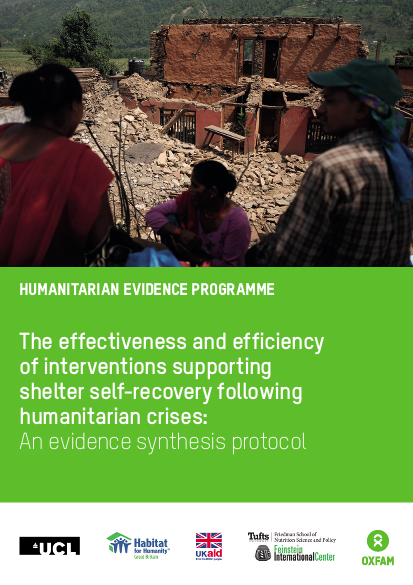
The Humanitarian Evidence Programme (HEP) is a Department for International Development (DFID) - funded partnership between Oxfam and the Feinstein International Center (FIC) at the Friedman School of Nutrition Science and Policy at Tufts University. The Programme aims to synthesise research in the humanitarian sector and communicate the findings to key stakeholders. Its ultimate goal is improving policy and practice.
Habitat for Humanity (HfH) and University College London (UCL) – the ‘Review Team’ – have been commissioned to complete a systematic review on the ‘impacts of different shelter and settlement strategies in the immediate aftermath of and recovery period following humanitarian emergencies’. Between August and November 2015 the Review Team undertook a scoping assessment in order to a) map the breadth, depth and nature of documentation available in the shelter and settlements sector; and b) engage with, and collect feedback from stakeholders to understand where there is demand for evidence synthesis.
The purpose of this document is to clearly describe the proposed research methodology so that it can be peer-reviewed prior to undertaking the study and replicated in future. Thus it describes:
- the theoretical background to the study (Section 2). This includes definitions of key terms used in the research, a proposed theory of change model for how the intervention might work and the justification for this research.
- the aim and research questions the study intends to address (Section 3).
- the methodology for undertaking the review (Section 4). This includes the inclusion and exclusion criteria, the search strategy and the procedure for data collection and analysis.
- the references used in this document (Section 5).
- appendices containing further details on the scoping assessment and the proposedsearch strategy, data extraction form and quality appraisal checklist for this review
- (Section 6).